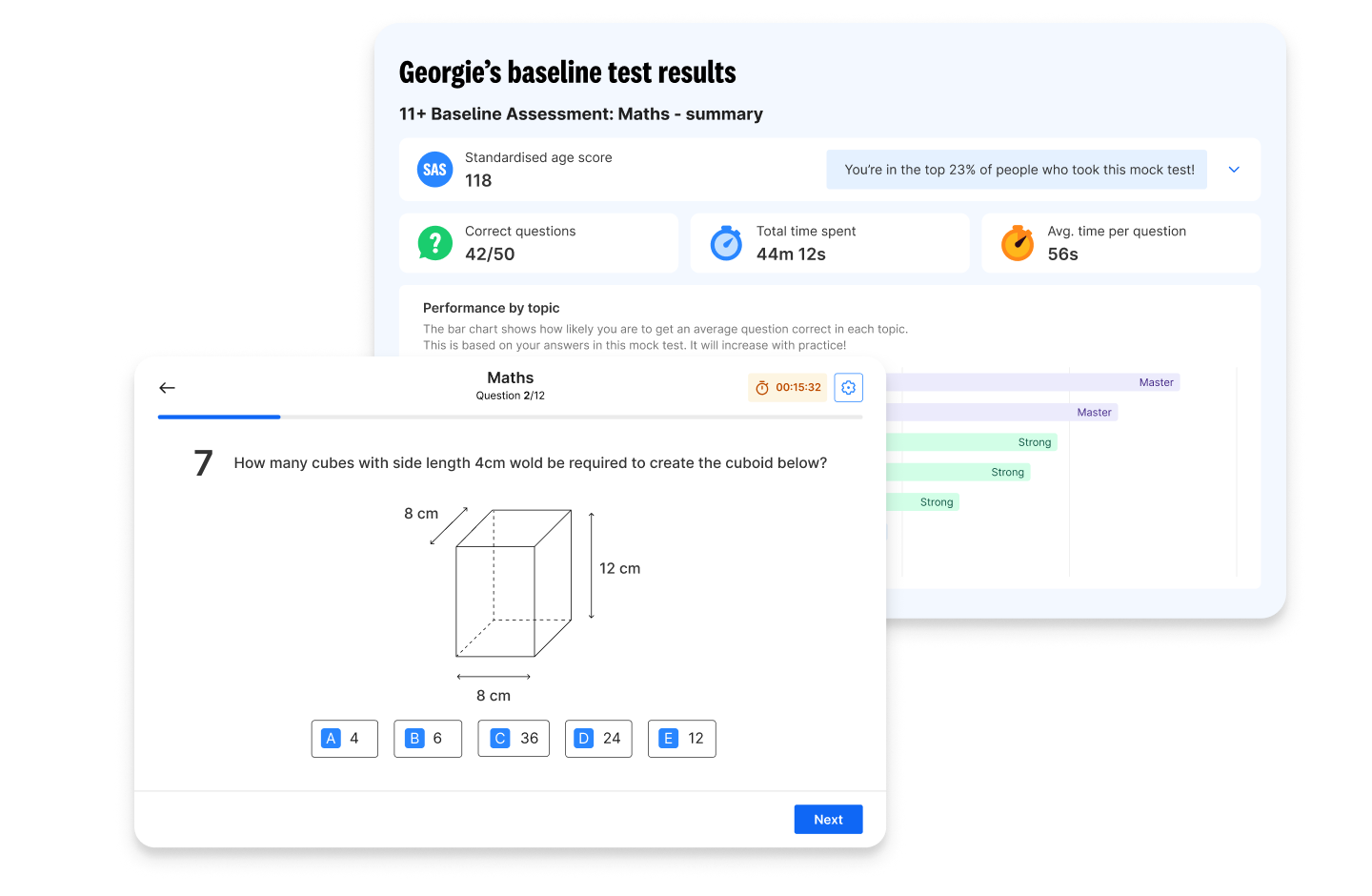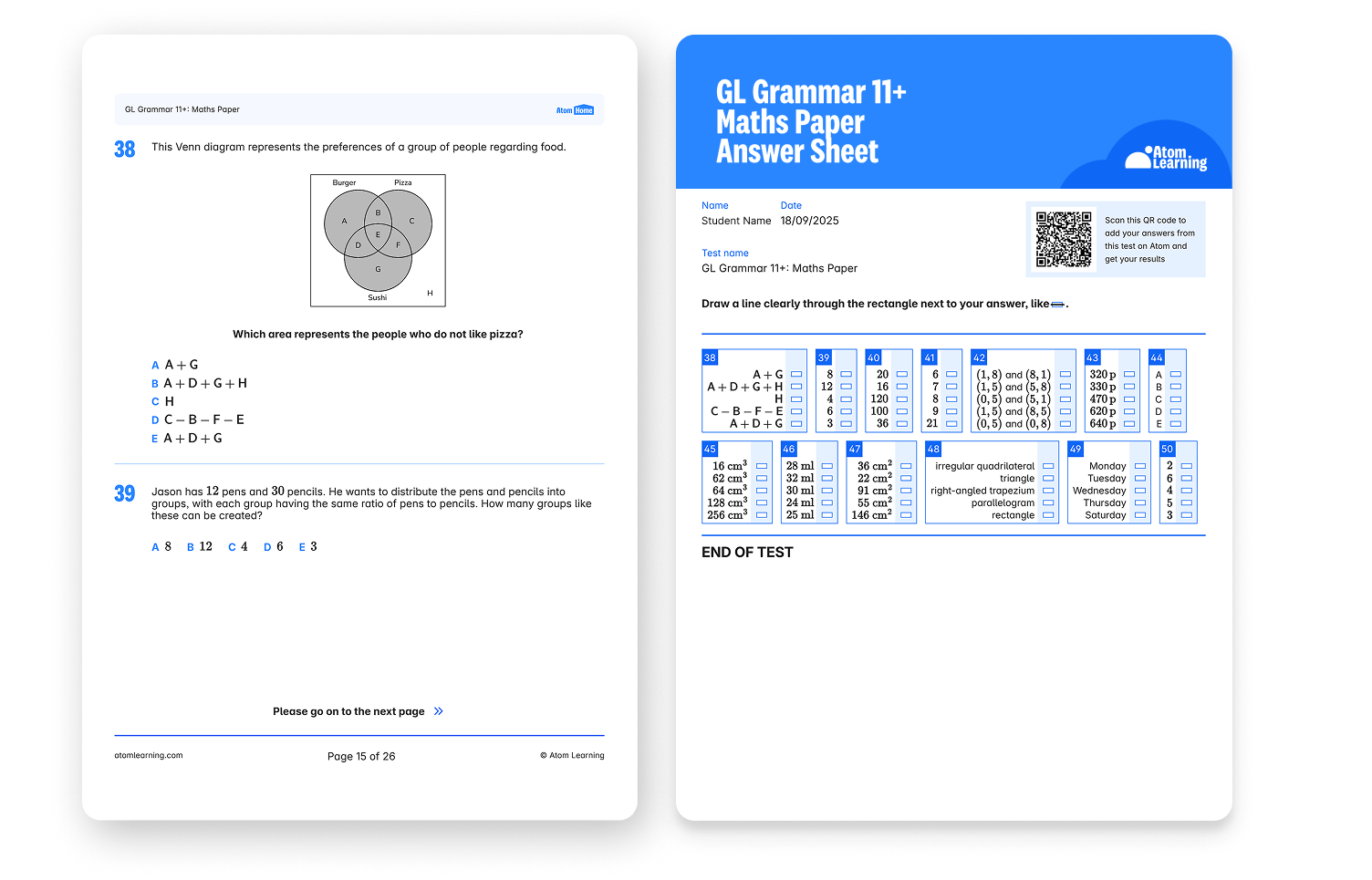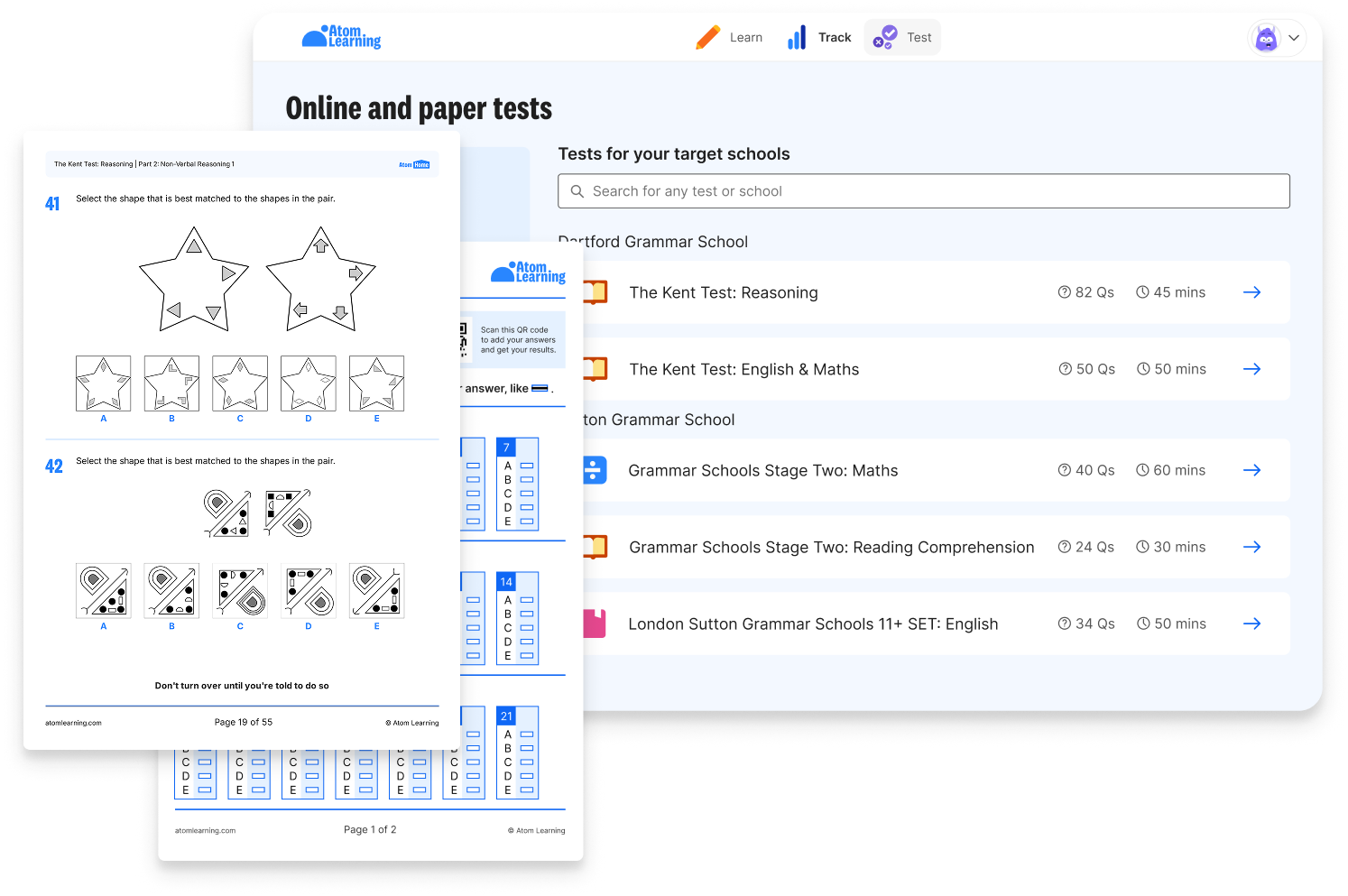Enfield grammar schools 11+ guide

Thinking about a grammar school in the London Borough of Enfield for your child? This guide walks you through how the system works, key dates for entry, and how to support your child through the 11+.
In this guide, you'll find:
- How the Enfield grammar school system works
- Key 11+ dates and deadlines for 2027 entry
- What your child will be tested on
- How the exam is scored and how places are allocated
- Practical ways to support your child's 11+ preparation
Enfield grammar schools
There is one grammar school in the London Borough of Enfield:
- The Latymer School (boys and girls)
The Latymer School is a co-educational grammar school located in Edmonton, north London. It has 192 places available in Year 7 each year.
If you are also considering grammar schools in neighbouring areas, you may want to look at Barnet grammar schools. Each area has its own registration process, so you will need to register separately for each school you apply to.
Key dates for 2027 entry
- Tuesday 17th March 2026: The Latymer School test registration opens
- Thursday 30th April 2026: The Latymer School open afternoon for prospective students and parents (Year 5 only, 12pm–5pm)
- Tuesday 2nd June 2026: The Latymer School test registration closes
- Thursday 3rd, Friday 4th and Saturday 5th September 2026: The Latymer School assessment test days (your child will be invited to attend one)
- Mid-October 2026: parents receive test results
- Saturday 31st October 2026: deadline to apply for secondary school places
- Monday 1st March 2027: secondary school national offers day
Dates may be subject to change. Always check with your target school for the latest information.
What is the 11+?
The 11+ is an academic entrance test used by grammar schools to assess children for Year 7 entry. Children who pass the test or meet a qualifying standard are eligible to apply for a place.
The test is taken in September of Year 6. Children born between 1 September 2015 and 31 August 2016 will sit the 11+ in September 2026 for entry to Year 7 in September 2027.
The Latymer School uses a combination of papers provided by GL Assessment and a written English paper set by the school itself.
Please note: The Latymer School has a defined catchment area. Only children whose home address falls within the school's Inner Area are eligible to apply. You should check whether your address falls within the Inner Area before registering. Full details are included in the How to apply section below.
What's on the Latymer School 11+?
Children applying to The Latymer School take three papers on exam day.
Maths and verbal reasoning
The maths and verbal reasoning papers are provided by GL Assessment. Both are multiple-choice, with answers completed on a separate answer sheet.
- Maths (30 minutes): questions based on Key Stage 2 maths content, including number, measurement, data, algebra and geometry
- Verbal reasoning (30 minutes): assesses your child's ability to use logic and solve problems with written information such as words, letters and symbols. Verbal reasoning is not typically taught at school, so it is worth familiarising your child with these question types in advance
English
The English paper (60 minutes) is set by The Latymer School and marked by school staff. It is not multiple-choice, and consists of two sections:
- Reading comprehension: your child will read a passage of text and answer questions to demonstrate their understanding, including their ability to identify literary devices and infer meaning
Creative writing: your child will be asked to continue the passage in their own words. This section assesses spelling, punctuation, grammar and creativity
Is your child ready for the 11+?
See where they stand in minutes. Atom’s free 11+ baseline tests give you an instant breakdown of their strengths and gaps. Know exactly what to focus on next and start preparing with direction, not uncertainty.

How is the Latymer School 11+ scored?
The maths and verbal reasoning papers are marked and age-standardised by GL Assessment, which means younger children are not disadvantaged. Children are then placed in rank order based on their combined maths and verbal reasoning score.
The English paper is marked by school staff for children who rank within the top 700 in the maths and verbal reasoning papers. The English score is then combined with the maths and verbal reasoning score to produce a final re-standardised result.
Results are sent to parents in mid-October 2026.
What's the pass mark for The Latymer School?
There is no single fixed pass mark. The Latymer School is highly competitive and frequently oversubscribed with qualified candidates, so achieving a strong score does not guarantee a place. Where the school receives more applications than places available, it allocates places using its oversubscription criteria.
Priority is given in this order:
- Looked after and previously looked after children ranked within the top 900
- Up to 20 places for children eligible for Free School Meals or Universal Credit, ranked within the top 900
- Up to 20 places for children who demonstrate exceptional musical talent, ranked within the top 700 (a separate music form with supporting evidence must be submitted by the registration deadline)
- Children living in the Inner Area, in rank score order
We always recommend reviewing The Latymer School's admissions policy carefully before applying.
How to apply to The Latymer School
1. Register for the 11+
You must register your child for the test using the online application form on The Latymer School's website.
- Registration opens: Tuesday 17th March 2026
- Registration closes: Tuesday 2nd June 2026
Your child will be invited to attend one of three assessment test days in early September 2026.
The Latymer School catchment area
The Latymer School only admits children whose home address falls within its published Inner Area. Your child's address must fall within one of the following postcode areas:
E2, E4, E5, E8, E9, E17, EN1, EN2, EN3, EN4, EN5 (sectors 1, 2, 4, 5 only), EN8 (sectors 7, 8, 9 only), N1 (not N1C), N2, N3, N4, N5, N6, N7, N8, N9, N10, N11, N12, N13, N14, N15, N16, N17, N18, N19, N20, N21, N22.
All children living within the Inner Area are treated equally, with places allocated in rank order. There is no preference given based on where within the Inner Area your child lives.
2. Apply for school places
Results are sent to parents in mid-October 2026. If your child meets the qualifying standard, you can list The Latymer School on your secondary school common application form (CAF), which must be submitted to your home local authority by Saturday 31st October 2026.
Before listing the school on your form, check its admissions policy and make sure your child is eligible.
3. National school offers day
On Monday 1st March 2027, you'll be informed which secondary school your child has been allocated.
If your preferred school isn't offered, your child will receive another local school place, and you'll be given information about how to appeal.
How can I help my child prepare for the 11+?
The 11+ can feel like a big milestone, but preparation doesn't have to be stressful.
Here are some practical ways to support your child in a calm, structured way.
Stay on track with a clear 11+ revision plan
One of the hardest parts of 11+ preparation isn't motivation – it's knowing what to work on, when, and how to stay consistent without it taking over family life.
A clear plan helps your child build skills in the right order and avoid last-minute cramming.
With Atom's Exam Plan, you enter your child's exam date and target schools, and Atom builds a personalised weekly plan based on the key skills they'll be tested on. It adapts as they improve and shows them exactly what to focus on each week.
That means less guesswork for you, less stress for them, and a clearer path to exam day.
Build 11+ exam technique with realistic practice papers

Once your child feels secure with the main topics, paper practice tests help them feel more confident with the exam format.
Atom's 11+ practice papers are designed to reflect real test conditions. Parents simply photograph their child's answer sheets and upload them to Atom for instant marking.
You'll get:
- a Standardised Age Score (SAS)
- clear insight into strengths and areas for improvement
- a comparison with other children applying to the same schools
The papers are unlimited, meaning your child can practise again and again with new questions each time.
Encourage regular reading for 11+ English success
Strong reading skills underpin almost every part of the 11+.
Encourage your child to read for 10–15 minutes a day, focusing on variety – fiction, non-fiction, different genres and authors.
This helps build:
- vocabulary
- comprehension and inference
- confidence with unfamiliar texts
If you're looking for ideas, Atom's recommended reading lists for Years 3–6 include a wide range of age-appropriate books.
Celebrate progress, not just 11+ scores

When you're supporting your child through 11+ preparation, what really matters is knowing they're moving in the right direction.
Atom's progress tracking gives you a clear, simple view of how your child is doing across topics and how their performance is developing over time.
That makes it easier to give meaningful encouragement, keep motivation steady and focus on consistent improvement – not just one-off test results.
Take control of your child’s 11+ preparation.

Not sure if your child is on track for the grammar school 11+? You don’t need to guess what to cover or whether they’re ready. Atom shows you exactly what to practise each week and how they’re performing, so you can stay ahead of the process without the stress.
- Follow personalised weekly exam plans that show them what to learn next.
- Download replica 11+ practice papers and upload a photo for instant, stress-free marking.
- Track progress and see how they compare to others applying to the same schools.
Start your free trial and help your child feel fully prepared for the 11+.

.svg)


